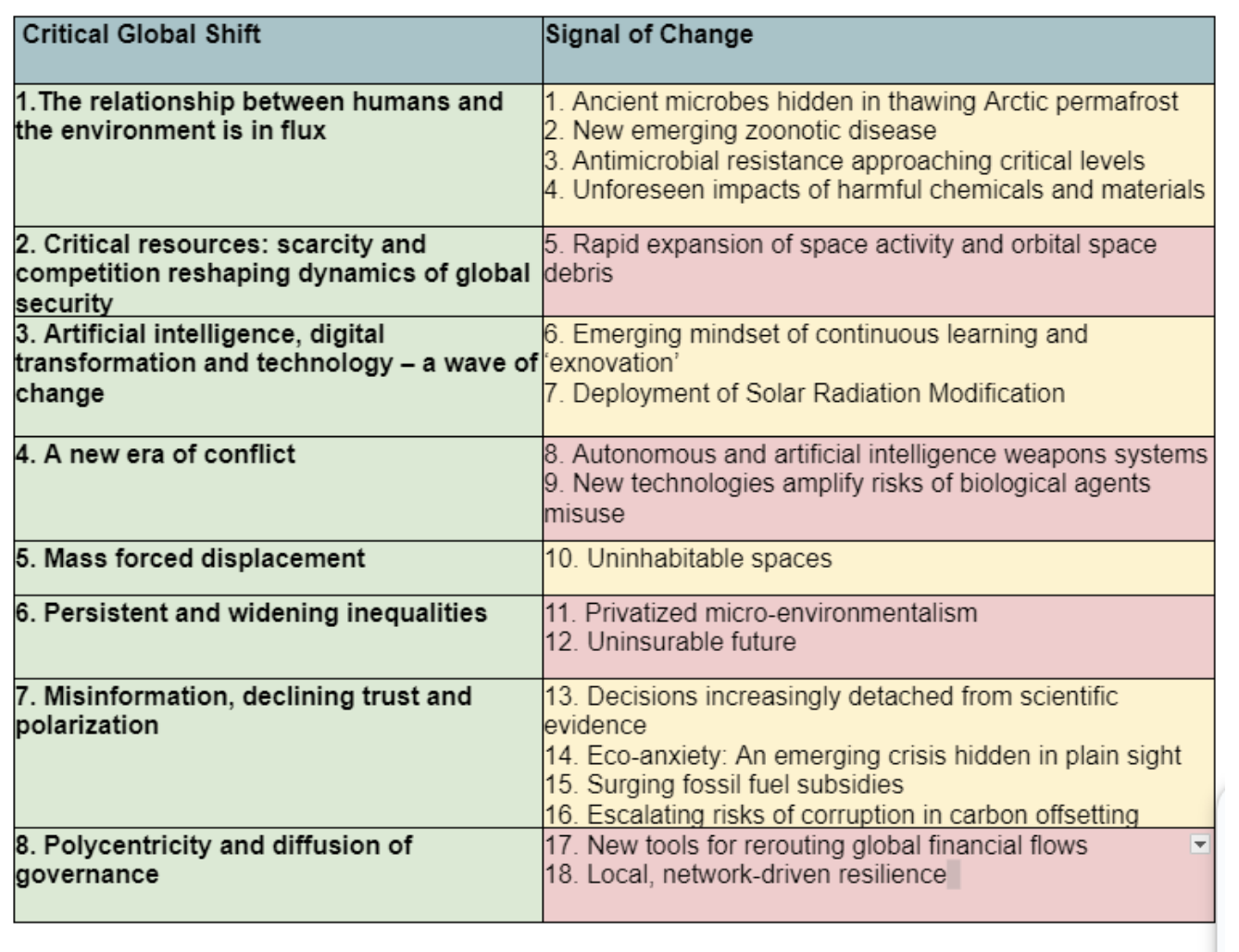News Excerpt:
The report "Navigating New Horizons – A Global Foresight Report on Planetary Health and Human Wellbeing", has been produced by the United Nations Environment Programme (UNEP) in collaboration with the International Science Council.
Background of the report:
- The report is in alignment with the United Nations' reform agenda and the Secretary-General’s report on 'Our Common Agenda', and the growing emphasis on the importance of foresight in addressing global systemic risks.
- The report urges the global community to acknowledge and respond to emerging challenges that threaten planetary health and human wellbeing.
- It presents insights on eight critical global shifts that are exacerbating the triple planetary crisis of climate change; biodiversity and nature loss; and Pollution and waste.
- The report identifies eighteen signals of change, distilled from the expertise of hundreds of global experts and consultations with regional stakeholders, including youth.
-
- These signals offer a glimpse into potential disruptions, both positive and negative, that warrant close monitoring.
- The report emphasizes the need for creating an enabling environment for better decision-making through a new social contract, agile and adaptive governance, and integrated, accessible data and knowledge.
Key Messages of the report:
- Polycrisis Era: The world faces a synchronized polycrisis driven by rapid technological developments, resource competition, conflicts, displacement, inequalities, distrust, misinformation, and multipolarity, with significant environmental implications.
- Environmental Degradation: Despite efforts, environmental degradation persists. The Great Acceleration exacerbates this, with increasing material extraction, fossil fuel use, and extreme weather events. Climate change could release ancient pathogenic microbes, posing health risks.
- Resource Scarcity: The demand for critical minerals to meet net-zero targets and digital transformation is creating new tensions. Increased mining, including deep sea and space mining, threatens biodiversity and local communities, highlighting the need for sustainable practices.
- AI's Environmental Impact: While AI offers growth opportunities, it also demands critical minerals and water resources, necessitating responsible resource management and environmental consideration in AI governance.
- Conflict and Environment: Armed conflicts are increasing, driven by resource scarcity and climate change, resulting in ecosystem degradation and pollution, with long-term recovery challenges from contamination and munitions residues.
- Forced Displacement: Forced displacement, driven by conflict and climate change, impacts human health and the environment, with significant strain on resources and services like water, sanitation, and energy.
- New Social Contract: Addressing these shifts requires a new social contract, engaging diverse stakeholders, including indigenous peoples and youth, and rethinking progress beyond GDP.
- Agile Governance: Implementing SDGs and climate targets needs agile governance with shorter-term targets, community empowerment, and financial system reconfiguration to reduce inequalities and environmental crises.
- Data Integration: Effective governance depends on integrated, accessible data for monitoring environmental changes, guiding investments, and improving decision-making.
- Foresight Adoption: Embracing foresight is crucial for shaping a better future and avoiding the negative consequences of past poorly considered decisions, such as those related to fossil fuels and plastic pollution.
Significance of the report:
- The insights from the report will be integrated into UNEP’s strategic planning, potentially influencing the next UNEP Medium-Term Strategy (MTS).
- This presents an opportunity to expand programs in areas such as artificial intelligence, new technology, and robotics in agriculture, prompting discussions on the level of engagement in these issues.
- By adopting a proactive posture, UNEP aims to modernize its tools for greater efficiency and cost saving
- The report will also serve as UNEP's contribution to the Summit of the Future.
- While it is not expected to substantially influence the Summit, it will provide valuable inputs into the preparatory discussions and events, including the High-level Political Forum.
- These contributions will be particularly relevant to discussions on environmental dimensions leading up to the Summit.
Conclusion
"Navigating New Horizons" offers a stark reminder of the urgent need for foresight in addressing the global systemic risks that threaten planetary health and human wellbeing. It calls for a collective effort to leverage human ingenuity and cooperation to find solutions to the pressing challenges of climate change, biodiversity loss, and pollution. By integrating these insights into strategic planning and international forums, UNEP aims to pave the way for a sustainable and resilient future.



